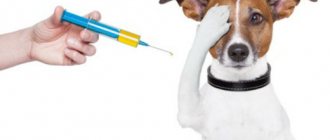Any living creature can get rabies, be it a wild animal, a pet or a person. This is a very serious and dangerous disease, which is almost always fatal. A living organism does not have its own immune response to rabies, so vaccination is necessary to prevent infection.
This is the only disease whose prevention is strictly controlled at the state level. There is even a special law on this matter. Therefore, it is mandatory for dogs to be vaccinated against rabies.
Indications for vaccine administration
There is no cure for rabies. The disease is provoked by a neurotropic virus, which, once in the nervous system, quickly affects brain cells.
Dogs are most often susceptible to this disease. Not only strays, but also pets are at risk.
While walking, your four-legged friend may be bitten by another dog carrying the virus. The infection is also transmitted through contact with cats.
Pets that are taken hunting can get the virus from wolves, foxes, and wild birds.
The danger of rabies is that the incubation period lasts at least 40 days without obvious signs of infection. When clinical changes begin, it is no longer possible to correct anything.
During this period, the sick animal spreads the infection to its immediate environment, first through saliva, then begins to bite. If there are other pets in the house (cats, birds, hamsters, etc.), they become potential victims of infection.
Already in the first days after infection, the animal is able to “share” the virus with its owners by licking their hands or face. The slightest crack or abrasion on the body is enough to get rabies.
Importance of grafting
The vaccine allows you to protect your pet by making it resistant to the virus. Even if a dog is bitten by a sick animal, the immunity that appears after the vaccination kicks in.
By protecting a pet in this way, the owner protects his family and surrounding people from serious danger.
Vaccination against rabies in dogs is not only regulated by law. A person bears some responsibility for failure to comply. When deviating from vaccination, owners face the following problems:
- unvaccinated animals cannot be walked in crowded places and transported on public transport;
- they should not be taken hunting, fishing, dacha, nature - the risk of infection is too great;
- Without a vaccination mark, a dog will not be allowed to participate in exhibitions and will not be allowed to travel abroad with it.
If a pet bites someone, the owner must present the dog's passport, which must contain a vaccination stamp. Otherwise, the animal is isolated for 10 days to monitor its behavior, and the owner is fined.
How and where to give the injection
Before giving the vaccination, the veterinarian examines the dog and takes the temperature. If she is healthy, the vaccine is injected into the withers under the skin. Some serums can be administered intramuscularly.
Next, a note is made in the pet’s veterinary passport indicating: the name of the drug, the date of administration. The seal of the veterinary clinic is affixed.
If the owner wants to vaccinate his dog at home, it is better to arrange such a service with a veterinarian in advance. Do not forget that the doctor’s visit will be paid according to a separate price list.
Routine rabies vaccination at a government agency is provided free of charge.
Contraindications
There is a list of animal conditions when rabies vaccination is contraindicated for it:
- increased body temperature;
- there are worms;
- immunodeficiency;
- underweight;
- presence of diseases;
- individual intolerance to the administered drug.
Some veterinarians recommend very carefully administering rabies serum to individuals over 10 years of age. Such advice is given because there is a considerable risk of unpleasant consequences in the body.
Vaccination procedure
Vaccinations for dogs begin 2 months after birth. During this period, a vaccine against major diseases is used. In the second round, at 12 weeks, the puppy is also vaccinated against rabies. Then revaccinations are carried out every year to strengthen the immune system.
The animal is prepared for the procedure: internal parasites and fleas are removed. Since the vaccine contains live strains, the pet must be completely healthy at the time of vaccination, otherwise the body will not be able to fight the virus.
Deworming of an animal
Treatment against parasites begins 10 days before vaccination. To eliminate worms, you can use Drontal, Kanikvantel plus, Milbemax. The products are used strictly according to the attached instructions.
If after the course the parasites have not disappeared, repeated cleaning is required. It is advisable to choose a different drug to avoid addiction.
Introduction of a complex vaccine
Any vaccination is stressful for the animal. To reduce the risk of injury to your dog, it is recommended to use polyvalent vaccines. They allow an animal to develop immunity from several diseases in one procedure.
It is recommended to use such drugs if you are planning to travel abroad with your dog.
The European Travel Union is guided by a list that limits the list of acceptable vaccines. In this case, the best option is the polyvalent drugs Duramun, Nobivak, Eurikan.
Administration of anti-rabies drug
The veterinarian can also give an injection with a monovalent drug, following the vaccination schedule. If several consecutive vaccinations are meant, then the doctor uses the same drug at each session.
A standard graph looks like this:
- at 3 months;
- at 1 year or 15 months;
- annually.
Unscheduled vaccinations are also carried out if a rabies quarantine has been declared in the area where the dog lives. Pets are also vaccinated if they are attacked by other animals.
Why get vaccinated?
A vaccine is a pharmaceutical preparation that provides immune protection against viral or bacterial diseases. The active substance of a vaccine is dead or weakened pathogens of a particular disease, or antibodies to a specific infection.
The introduction of a vaccine initiates the work of the body's defenses. As a result, immunity to a certain type of pathogenic microflora is formed. If the animal subsequently encounters an infection, it will not get sick or the disease will be mild.
Vaccination of dogs is necessary in order to protect your pet from extremely dangerous diseases with a possible fatal outcome:
- rabies;
- hepatitis - an infectious disease that affects the liver;
- parainfluenza - a viral infection that affects the upper respiratory tract;
- Canine distemper (distemper) is a fever caused by a virus. Negatively affects mucous membranes, skin, central nervous system;
- parovirus enteritis - a disease caused by paroviruses and coronaviruses. Has a damaging effect on the intestines and heart. The mortality rate of puppies without treatment reaches 80%;
- Leptospirosis is a multisystem disease, affecting almost all systems: liver, kidneys, eyes, lungs, spleen, heart, pancreas, genitals. Mortality rate is up to 50%.
Types of vaccinations
Before vaccinating a dog, its owner should know what types of vaccines exist. Classification can be done depending on several factors.
- Number of vaccinated infections: monovalent (monovalent) - develop immunity from one disease, for example, Biovac-D, Multikan-1;
- polyvalent (complex) - protect against a complex of diseases, for example, Multikan-4, Nobivak.
- attenuated - contain live weakened pathogens, promote the production of antibodies by the body. Form strong immunity;
When should you not vaccinate?
Veterinarians at the Svoy Doctor network of veterinary clinics do not recommend vaccination in the following situations:
- temperature increase above 39.2 °;
- acute disease or exacerbation of a chronic disease;
- recent surgery or physical trauma;
- acquired immunodeficiency;
- physical exhaustion;
- planned mating;
- heat;
- age up to two months;
- pregnancy of females;
- breast-feeding;
- change of baby teeth;
- two weeks before and after tail or ear docking;
- helminth infestation;
- individual intolerance to the vaccine.
Is quarantine necessary after vaccination?
The administered drug does not provide immediate protection.
Expert opinion
Panteleeva Irina Petrovna
Breeder, 11 years experience.
In order for the immune system to begin to resist foreign organisms, it takes time to produce antibodies. This takes from 8 days to 2 weeks, during which the animal feels unwell and becomes vulnerable to any infection.
Purpose of quarantine
It is necessary to exclude contact between your pet and stray dogs, other animals and strangers.
The following activities are carried out:
- Limiting the physical and mental stress of a weakened pet.
- Close monitoring of the dog’s health in order to timely identify negative reactions to the vaccine.
- Creating optimal conditions for the period of strengthening immunity: protection from overheating, hypothermia, stress and other negative factors.
The question of whether a dog needs quarantine after vaccination should not even arise. This is especially true for puppies being vaccinated for the first time.
Preparing a dog for vaccination - a list of procedures before vaccination
In simple terms, vaccination is microinfection of an animal in order to develop antibodies to the causative agent of a specific disease. Immunization is a burden on the body. To ensure that the vaccine works but does not cause ill health or illness, certain preparation rules have been developed.
The owner of a pet should know: is it possible to feed the dog before vaccination, take it outside for a walk, or give an anthelmintic. The list of procedures included in the preparation complex is differentiated depending on the age of the animal.
Puppy
The body of a small creature is extremely responsive to the influence of various external factors. To protect your baby from potential complications, strict adherence to the preparation rules is necessary.
What should be done:
- do not walk the animal before vaccination, its immunity is not yet ready to meet pathogenic microorganisms;
- check the condition of the puppy, he must be completely healthy. Health indicators: absence of fever, apathy, nasal discharge, sneezing, diarrhea, good appetite;
- examine fur and skin for fleas and ticks. These parasites can cause infection with many dangerous diseases, and their waste products can cause intoxication of the body. If insects are detected, the animal must be sanitized immediately. This can be done with special preparations, produced in large quantities by veterinary pharmaceutical manufacturers. Important: the anti-parasite product must have a mark stating that it can be used to treat small puppies;
- Before vaccination, administer anthelmintic to the dog, strictly following the recommendations prescribed in the annotation for the medicine. Deworming should be done 7 days after using medications for external parasites. Even if the puppy does not have a helminthic infestation, antihelminthic treatment is necessary for preventive purposes. This must be done 14 days before the vaccination date;
- ensure a calm psycho-emotional environment: avoid stressful situations, excessive emotional or physical excitement.
Adult
The list of preparatory procedures for adult pets is as follows:
- carry out prevention against external parasites - fleas and ticks. It is optimal to use a product that has already been used previously to avoid an allergic reaction;
- It is imperative to worm the dog before vaccination; this will protect the pet from unwanted complications after vaccination. Veterinarians advise performing the procedure 7 days after tick and flea prevention;
- During the week before visiting the clinic, it is recommended to check the animal’s physical condition, monitor its temperature and mood. Important: apathy and depression can be signs of illness.
Notes:
- if the bitch is pregnant, then she should be vaccinated closer to the end of the gestation period;
- You should adhere to the vaccination schedule; it is extremely undesirable to delay the timing of revaccination.
Consequences of failure to comply with dog isolation periods
If you ignore the veterinarian's recommendations regarding the rehabilitation period after vaccination, any irreversible consequences are possible.
How are quarantine periods set?
The deadlines are determined individually in each specific case, taking into account the following factors:
- Puppies have a more weakened immune system compared to adults. therefore, a long period of rehabilitation is prescribed for children;
- the survival rate of the strain introduced for the first time takes longer, and after each revaccination the quarantine period is shortened;
- It is important to pay attention to the type of vaccine: when using polyvalent strains, the body needs more time to produce antibodies.
In the latter case, the immunization process takes at least 3 weeks. For weakened dogs and puppies, quarantine after polyvaccination should last about 30 days.
Dog at risk
While the body has directed all its efforts to produce antibodies, the animal becomes open to any infection.
If you do not keep your pet at home, the risk of contracting rabies increases many times over, and vaccination will not help save your pet from death.
Other consequences
If quarantine is not observed, dog owners also experience inconvenience.
If the owner violates the conditions of rehabilitation, he will not only not be able to take the pet with him abroad, but will also not be allowed on planes and trains to travel around the country. The dog will not be able to take part in any exhibition.
Recommendations for people infected with rabies
To achieve a complete cure, a person faced with a disease such as rabies must follow a number of simple rules. He needs not only to undergo a course of therapy, but also to avoid heavy physical labor, not to get overcooled, and to protect himself from overheating. Another important rule is to try to avoid overwork, strong emotional experiences, and, of course, completely remove alcohol from your diet for a while!
If you follow the recommendations of your doctor, you can count on a positive effect from the therapy. It is possible to fight the spreading virus! If you seek qualified help in a timely manner, you will definitely be able to defeat rabies, but alcoholic drinks can wait!
Treatment of alcoholism and withdrawal from binge drinking is carried out through an application on the website or by phone, and a specialist will also recommend a private drug treatment clinic for coding for alcoholism. We work around the clock.
Caring for the animal after vaccination
During quarantine, the dog’s usual rhythm of life changes. They not only try not to walk her, but also limit her contact with other pets in order to eliminate the risk of the slightest infection.
The veterinarian gives recommendations on a balanced diet to support a weakened body.
There is also a limitation on the number of water procedures. If the dog is an adult, then 7-10 days after vaccination it can be bathed. But the puppy will have to endure until the end of quarantine. But if the need arises, then adhere to the following rules:
- use only warm water and shampoo that does not cause allergies;
- when swimming and for some time after it, all windows and doors in the house should be closed to avoid drafts;
- you need to use 2 towels - one to dry the fur well, and the other to wrap the pet until completely dry.
A vaccinated dog should be protected from hypothermia. It is also important to monitor the emotional state - you should not expose the animal to stress.
Treatment for worms
Anthelmintics are available in different forms:
- pills;
- capsules;
- suspensions;
- powders.
Regardless of the type of medication, the dose is calculated based on the dog's weight. The drug is given on an empty stomach in the morning before the first feeding. On the day of deworming treatment, the pet is not fed dairy products. Typically, 1 tablet is designed for 10 kg of dog weight, but for convenience, many manufacturers produce drugs designed for 0.5 - 2 kg, 20 kg, 40 kg of live weight and similar dosages.
It is important to provide your dog with enough clean water. After taking the medicine, you need to monitor your pet’s well-being. Sometimes there is lethargy, drowsiness, and in some cases vomiting. This effect is not provided by drugs; this condition of the pet occurs if the dog has been infected with worms and they, having died, will be excreted from the body. If symptoms do not go away within a day, you should take your dog to the doctor.
There are many different anthelmintics; it is useful to consult a veterinarian to help you decide on your choice. The best anthelmintics are Drontal, Kaniverm, Kanikvantel, Prazitel, Prazitsid, Profender.
Do not use anti-worm medications for pregnant or lactating bitches or weakened dogs. Also, some active ingredients are contraindicated for representatives of the Collie, Shetland Sheepdog and Bobtail breeds.
Fleas are carriers of worm eggs, so it is important to follow the sequence of treatments - first drive away external parasites, then internal ones.
Otherwise, repeated helminthic infestation (infection with parasites) may occur and treatment will have to be carried out again, which is an extra burden on the pet’s body and an unnecessary waste of time.
Side effects after vaccination: what can happen to a dog
Quarantine after vaccination is also necessary in order to provide the pet with the necessary help in a timely manner if something goes wrong after the procedure. Animals, like people, react differently to drugs.
Standard options
No vaccination takes place without complications. If a swelling (or even a lump) forms at the injection site, redness is noticeable, and a high temperature rises, the symptoms can be considered a physiological norm . But only if the signs are observed for a week, no more.
Other complications that should not cause the owner to panic include:
- lethargy of the animal within 24 hours after vaccination;
- minor vomiting and problems with stool;
- short-term lack of appetite.
All these are normal consequences of immunization and are not pathologies. But if symptoms last more than 10 days after vaccination, you should contact your veterinarian.
Deviations worth paying attention to
If vaccination was not carried out according to the rules, without observing hygiene standards, more serious complications may arise:
- frequent intense vomiting;
- persistent temperature above +39 °C;
- refusal to eat and severe weakness for more than 24 hours;
- muscle twitching, cramps;
- severe pain at the injection site.
The dog may limp or drag its hind legs - this is also abnormal.
Any of the complications develops against the background of a hidden illness that was not noticed during preparation for the procedure. Negative consequences are often caused by a low-quality vaccine.
What to do if you have allergies
An inadequate reaction sometimes manifests itself in the form of shortness of breath or hypoxia, serous discharge from the sinuses and eyes, salivation, and even anaphylactic shock.
The pet must be taken to the doctor immediately, having first provided medical care at home. The following are recommended as antihistamines: Tavegil, Suprastin, Diphenhydramine.
What is rabies?
Rabies (or rabies, from the Latin word rabies, hydrophobia, fear of water) is an acute infectious disease resulting from the bite of a dog or other infected animal, which is characterized by severe damage to the nervous system and usually ends in death.
The danger of rabies was known in ancient times, but there were no treatment methods, and every victim was doomed to death.
Only the great French scientist Louis Pasteur managed to create a vaccine against rabies (rabies vaccine) in 1885. On July 6, 1885, he saved the life of a 15-year-old teenager who was bitten by a rabid dog.
How does rabies become infected?
The causative agent of rabies is the Neuroiyctes rabid virus, which contains a single strand of RNA. The virus is resistant to freezing, antibiotics and phenol, drying, and direct sunlight. Destroyed by heat, acids and alkalis.
When a dog (or other animal) bites, infection occurs as a result of saliva from a rabid animal entering the wound. Once under the skin, the rabies virus quickly reaches the central and peripheral nervous systems. The rate of spread of the disease depends on the location of the wound (the higher the bite site, the faster the infection), the depth and size of the wound, and the reactogenicity of the human body (i.e., the susceptibility of the nervous system to a given pathogen).
1 Dog bite. First aid
2 Dog bite. First aid
3 Dog bite. First aid
Symptoms of rabies
The incubation period lasts from 1 to 3 months (sometimes from 12 days to a year). The speed of spread is influenced by the location of the bite.
There are 3 stages of the disease: initial (depression), stage of excitement, stage of paralysis.
Stage 1 of rabies:
- unpleasant sensations at the site of the bite with irradiation to the center, itching, hyperesthesia of the skin, although the wound may already have healed;
- sometimes inflammation reappears at the wound site, the scar becomes red and swollen;
- if the bite is on the face, then olfactory and visual hallucinations are observed;
- general weakness, headaches;
- nervousness and irritability;
- disruption of the gastrointestinal tract (decreased appetite, nausea, vomiting);
- constant increase in temperature to 37-37.5 degrees;
- disruption of the nervous system (sadness, fear, anxiety, apathy, nightmares);
- severe sensitivity of vision and hearing (ordinary sound or light begins to interfere).
Stage 2 of rabies - agitation (lasts from 2 to 4 days):
- the appearance of anxiety, increased heart rate;
- difficulty breathing and swallowing;
- the appearance and intensification of hydrophobia (fear is caused by the splashing, murmur, transfusion of water, its appearance, etc.);
- fear of light, loud sounds, open air (accompanied by muscle spasms and twitching, breathing problems);
- convulsions;
- attacks of aggression (a person scratches, bites, spits, fights, hits walls);
- disturbance of reason (appearance of delusional ideas, visual and auditory hallucinations).
After the attack passes, the person calms down and feels good.
Stage 3 rabies:
Symptoms of rabies at the stage of paralysis are associated with loss of activity of the subcortical formations and cerebral cortex, manifested in a weakening of sensory and motor functions.
The attacks stop. Body temperature rises to 40-42 degrees, hypotension and tachycardia appear. Death can occur within a day due to paralysis or cardiac arrest.
Duration of quarantine
Vaccination of animals against rabies is regulated by law. Not only the schedule for administering the vaccine has been established, but also the quarantine period after the procedure.
The veterinary legislation (section “Measures for the prevention of rabies”) specifies the uniform quarantine period for the Russian Federation - 1 month.
Instructions that come with vaccines may indicate shorter durations. These recommendations can be followed if the dog will not be taken anywhere or sold.
When can you take your dog out into the world? If the pet participates in exhibitions and other competitions, the vaccination stamp in the passport should not be expired.
An unvaccinated dog is vaccinated no later than a month before the event with a mandatory quarantine of 30 days.
What to pay attention to
2–3 days before the planned vaccination, you need to measure your pet’s body temperature. Normally, the temperature of a healthy dog is 37.5 – 39 °C. Examine the mucous membranes of the oral cavity - gums, inner surfaces of the lips, cheeks, mucous membranes of the eyes. They should be moist and pink (in the absence of natural pigmentation). If ulcers, dryness, pallor, yellowness, cyanosis or other abnormalities are detected, the dog should be shown to a veterinarian.
Be sure to evaluate the pet's behavior - the dog must be playful, active, and have a good appetite. There should be no signs of stress, lethargy, or apathy.
Any suspicious changes in health can serve as a signal of illness. In such a situation, the pet must be taken to a veterinary clinic for an examination and, if necessary, laboratory tests of blood, urine, and feces. After receiving the results, the veterinarian will make a verdict on whether everything is okay with the four-legged patient and whether vaccination can be done.
What is quarantine and why is it needed?
Many owners do not understand what quarantine is and why it is needed. Quarantine is a condition in which an animal is kept so that it cannot contact the outside world.
Quarantine is used to confirm or remove a diagnosis associated with any viral threat. During quarantine, other animals and people should not come into contact with the dog. In addition, the situation should not change.
Important! To comply with quarantine, it is necessary to maintain cleanliness in your home.
Any vaccination is the introduction of a weakened virus into the animal’s blood. The vaccine can be live or synthetic, respectively, the virus is of natural or laboratory origin. Natural or live vaccines are considered more effective, while synthetic ones are considered safer.
Regardless of the type of vaccine that was administered to the dog, its immunity is attacked by enemy agents. The immune system is stimulated, as a result of which the dog becomes vulnerable to viruses of various natures. After vaccination, the dog is vulnerable to infectious, fungal and bacterial diseases.
Why is it important to vaccinate your dog against rabies?
To begin with, it is worth saying a few words about the general situation with rabies in our country. And she is quite serious. It is for this reason that there is a law according to which all domestic dogs and cats must undergo mandatory annual vaccinations. Unfortunately, this rule is not always followed by everyone, as a result of which the disease constantly circulates in the external environment.
But why do veterinarians and breeders attach so much importance to the first vaccination? The thing is that it is this vaccination that determines how intense and strong the dog’s immunity will be.











